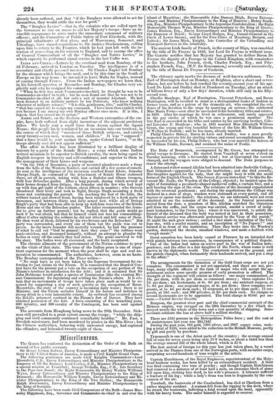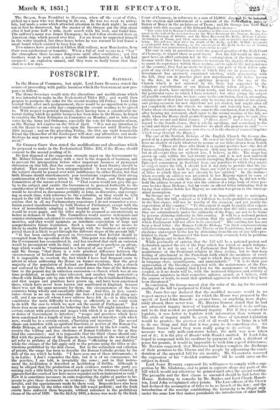Viortllantoug.
The Queen has conferred the distinction of the Order of the Bath on several of her public servants.
Sir Henry Lytton Bulwer, Envoy Extraordinary and Minister Plenipoten- tiary to the United States of America, is made a Civil Knight Grand Cross.
The following gentlemen are made Civil Knights Commanders—Lord Bloomfield, C.B., Envoy Extraordinary and Minister Plenipotentiary to the Emperor of All the Russias; Lord Cowley, C.B., Minister Plenipotentiary on a special mission at Frankfort; George Nicholls, Esq.., C.B. late Secretary to the Poor-law Board ; the Right Honourable Sir Henry Watkin Williams Wynn, Envoy Extraordinary and Minister Plenipotentiary to the King of Denmark ; the Honourable William Temple, Envoy Extraordinary and Mi- nister Plenipotentiary to the King of the Two Sicilies; the Honourable Ralph Abercromby, Envoy Extraordinary and Minister Plenipotentiary to the King of Sardinia.
The following have been made Civil Companions of the Bath—James Mac- aulay Higginson, Esq., Governor and Commander-in-chief in and over the
island of Mauritius ; the Honourable John Daman Blies, Envoy Extraor- dinag. and Minister Plenipotentiary to the King of Hanover; _Henry South- ern, Esq., Minister Plenipotentiary to the Argentine Confederation ; the Right Honourable Thomas Wyse, Minister Plenipotentiary to the King of Greece ; James Hudson, Esq., Envoy Extraordinary and Minister Plenipotentiary to the Emperor of Brazil ; George Lloyd Hodges, Esq., Consul-General in the Circle of Lower Saxony, and for the Free Cities of Hamburg, Bremen, and Lubeck ; Sir James Meek, Knight, late Controller of the viconliin and. Transport Services in the Admiralty.
The ancient Irish family of French, in the county of Sligo, was ennobled by the title of De Freyne in 1839, but Lord Be Freyne is without issue. The Gazette notifies that her Majesty has granted to Arthur Baron De Freyne the dignity of a Peerage in the United Kingdom, with remainders to his brothers, john French, clerk, Charles French, Esq, and Fitz- stephen French, Esq., (M.P. for Roscommon,) severally and successively, by the title of Baron De Freyne of Coolavin.
The obituary again marks the decease of well-known noblemen. The Earl of Harrington died on Monday, at Brighton, after a short and severe illness, but not before he had reached the seventy-second year of his age. Lord De Lisle and Dudley died at Penshurst on Tuesday, after an attack of bilious fever of only a few days' duration, while still only in his fifty- second year. Charles Stanhope, Earl of Harrington, Viscount Petersham, and Baron Harrington, will be recalled to mind as a distinguished leader of fashion in former years, and as a patron of the dramatic art, who completed the evi- dence of his devotion to the stage by marrying an actress—the celebrated Miss Maria Foote—soon after he succeeded to his hereditary titles and estates, in 1829. After his marriage he lived in retirement, and rarely appeared in the gay circles of which he was once a prominent member. The late Earl is succeeded in his titles and estates by his surviving brother, Colo- nel Leicester F. Stanhope ; who in 1831 married Miss Elizabeth William Green, the young and very beautiful heiress of the late Mr. William Green i of Welbye n Norfolk ; and he has issue already married.
Philip Charles Sidney, Baron de Lisle and Dudley, was a man greatly respected in private life for sterling virtues and sound accomplishments. He is succeeded by his son, Philip Sidney, who last year married the heiress of Sir William Foulis, Baronet, and assumed the name of Foulis.
The Duke of Brunswick, accompanied by Mr. Green, has attempted an aerial voyage to Germany. He started from Vauxhall at seven o'clock ma Tuesday morning, with a favourable wind ; but at Gravesend the current changed, and the voyagers were obliged to descend. The Duke purposes to renew the attempt.
A distressed widow named Allchin had been admitted into Sackville College, East Grinstead—apparently a Puseyite institution ; and she died recently.. Her daughter applied for the body, that she might bury it with the usual forms of the English Church. The Sussex Express states that "to this the Re- verend Mr. Neale, the Warden of the College objected ; he insisted upon the right of furnishing a peculiarly-shaped medival coffin, a curtain bier, and a pall bearing the sign of the cross. The relations of the deceased expostulated with the reverend gentleman ; and during the negotiations the College was declared in a state of siege, warders were stationed at every portal, and all ingress or egress was denied ; the relations, we are informed, were not even admitted to see the remains of the deceased. As the funeral procession moved from the door, a grandson of Mrs. Allchin snatched the obnoxious pall from the coffin, and the corpse was carried, amidst a crowd of indig- nant bystanders, to the Crown Inn ; where it was unscrewed, to satisfy the friends of the deceased that the body was indeed at last in their possession. The funeral service was afterwards performed by the Vicar of the parish?' At night the mob grew riotous ; carried a bier made in imitation of the Col- lege one, with a scarlet mantle, and an inscription of "No Popery !" and burned it in front of the institution. Then they broke into the Warden's' garden, destroyed the shrubs, smashed windows, and made a hubbub with
rough music."
Great sensation has been lately caused at Florence by an intended duet with pistols between two countesses, in consequence of a political dispute. "One of the lathes had taken an active part in the war of Italian inde- pendence, and the other is a fair daughter of the North, whose name is well known in the diplomatic world. The combatants were on the ground, and the pistols charged, when fortunately their husbands arrived, and put a stop. to the affair.'
The twrangements for the formation of the Gold Coast corps are not yet complete. The commandant is not yet appointed, and there are not, per- haps, many eligible officers of the rank of major who will accept the ap- pointment unless some specific promise of early promotion is offered. The strength of the regiment will consist as follows : one major commandant, at 16s. per diem, with 3s. per diem as command money ; three captains
7d. per diem ; six lieutenants, at 68. 6d. per diem ; one assistant surgeon, at 78. 6d. per diem • one sergeant-major, at 4s. per diem; three company ser- geants, at is. 4/. per diem each ; 12 sergeants, at is. per diem each ; 12 cor- porals, at 10d. each; and 300 privates, at 8d. per diem each. No ensigns or second-lieutenants are to be appointed. The total charge is 6154/. per an- num.— United Service Gazette.
Rangoon, the greatest river port and the chief commercial entrepot of the Birmese empire, was ravaged on the 28th December by a fire which de- stroyed nearly the whole of the town and a vast quantity of shipping. Some. accounts estimate the loss at above half a million sterling.
There are 5525 persons in the Metropolitan Police force ; and the cost of its maintenance last year was 385,744/.
During the past year, 163 gold, 1295 silver, and 2067 copper coins, mak- ing a total of 3525, were added to the collection in the British Museum, partly by gift and partly by purchase.
Tynemouth is one of the driest parts of the country ; the average annual fall of rain for seven years being only 211 inches,or about a third less than the average annual fall of the whole island, which is 311.
The first arrival of foreign ice this year has just taken place, by a vessel arrived in the Thames from one of the Norwegian ports, with an entire cargo, comprising several hundreds of tons weight of the article.
Captain Hutchinson, of the Royal Engineers, superintendent of the Holy- head harbour works, has been killed by an extraordinary accident. A blast was fired containing two tons of powder ; and though Captain Hutchinson_ had removed to a distance of at least half a mile, an immense block of stone fell upon him striking him dead, in his wife's presence. A labourer suffered a fracture of his leg ; while a lady's dress was torn to fragments by the con.- cussion of the air.
Turnbull, the boatswain of the Cumberland, has died at Chatham from a rather singular accident. A seaman fell from the rigging to the deck, where he struck the boatswain, inflicting a fatal wound upon the head, apparently with his heavy boots. The sailor himself is expected to recever.
The Oregon, from Frankfort to Havanna, when off the coast of Cuba, I picked up a man who was floating in the sea. He was too weak to articu- late, but made a noise which attracted attention in the dark night; he could not at first be discovered, but the master of the Oregon put the ship about after it had gone half a mile, made search with his boat, and found him. The sufferer's name was James Thompson ; he had fallen overboard from an American ship, which passed over him. For six hours he supported himself in the water unaided, but three hours before he was rescued he had found a small board which assisted to buoy hini up. Two nnuers have perished at Clifton Hall colliery, near Manchester, from their own carelessness or temerity. When a fall of roof occurs hi a " bay " the atmosphere there becomes dangerous until after ventilation; yet two brothers went to work with a naked candle immediately after a fall had occurred : an explosion ensued, and they were so badly burnt that they died in a few days.



























 Previous page
Previous page